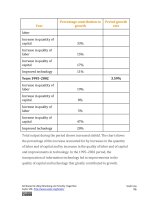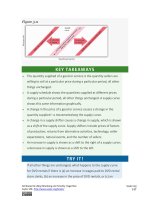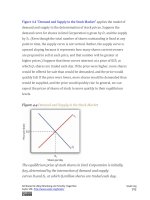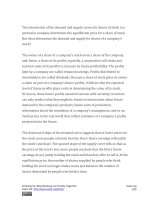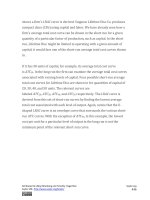Authors libby rittenberg 722
Bạn đang xem bản rút gọn của tài liệu. Xem và tải ngay bản đầy đủ của tài liệu tại đây (534.69 KB, 1 trang )
The payment for a resource above the minimum price necessary to
make the resource available is economic rent.
TRY IT!
You have just been given an oil well in Texas by Aunt Carmen. The
current price of oil is $45 per barrel, and it is estimated that your oil
deposit contains about 10,000 barrels of oil. For simplicity, assume
that it does not cost anything to extract the oil and get it to market
and that you must decide whether to empty the well now or wait until
next year. Suppose the interest rate is 10% and that you expect that
the price of oil next year will rise to $54 per barrel. What should you
do? Would your decision change if the choice were to empty the well
now or in two years?
Case in Point: World Oil Dilemma
The world is going to need a great deal more oil. Perhaps soon.
The International Energy Agency, regarded as one of the world’s most
reliable in assessing the global energy market, says that world oil
production must increase from 87 million barrels per day in 2008 to 99
million barrels per day by 2015. Looking farther ahead, the situation gets
scarier. Jad Mouawad reported in The New York Times that the number of
cars and trucks in the world is expected to double—to 2 billion—in 30
years. The number of passenger jetliners in the world will double in 20
years. The IEA says that the demand for oil will increase by 35% by 2030.
Meeting that demand would, according to the Times, require pumping an
additional 11 billion barrels of oil each year—an increase of 13%.
Certainly some in Saudi Arabia, which holds a quarter of the world’s oil
reserves, were sure it would be capable of meeting the world’s demand for
Attributed to Libby Rittenberg and Timothy Tregarthen
Saylor URL: />
Saylor.org
722
